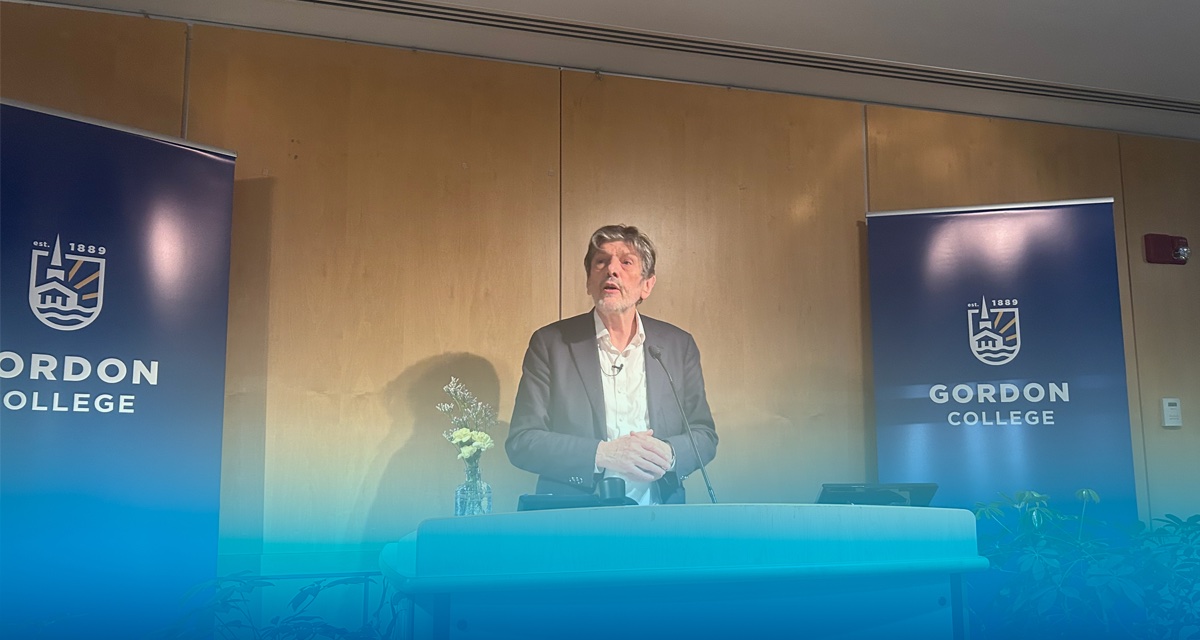From Greed to Grace: Michael O’Siadhail’s Poetry Sheds Insight on Human Desire
Follow your heart. Do what you feel is right. These are the messages our society tells us when it comes to managing our desires. While well-intentioned, these mantras have too often become self-serving at the expense of our planet, our neighbors and even our mental health. How do we pursue our desires while serving the common good?
On February 5 the Center for Faith and Inquiry (CFI) and the Princemere Writers Series collaborated to invite Irish poet Micheal O’Siadhail, who presented his own approach to navigating questions of self and service—poetry. An internationally acclaimed and award-winning sonneteer, his newest book Desire—a quartet of sonnets, terza rima and other poetry styles—gets quite literally at the heart of the issue: What is it that we really desire, and what is truly worth desiring?
“It seems to me that only a change of heart, only a recovery of the sacred, can actually help us address the current state of the world,” O’Siadhail says. As for what we should desire, “to me it has to be something spiritual. It has to be something greater than ourselves.”
Finding Meaning Amidst Brokenness
The inspiration for O’Siadhail’s poems started with the COVID-19 pandemic. O’Siadhail had picked up his wife, a breast cancer surgeon, from her shift at the hospital, when she shared a heavy story. As she was in the middle of an operation, the ventilator her patient was using was taken away. The hospital had run out, and now they had to make very hard ethical decisions: Who had the better chance of surviving, and who would get the ventilators?
It was a downward spiral from there as O’Siadhail watched the world collapse from his window. He remembered observing people hoard supplies and refuse to stay away from their at-risk neighbors and spend excessive amounts of money on ecommerce products simply because the internet told people they needed these things. Meanwhile, six million people died worldwide.
Confused and appalled, O’Siadhail researched how the pandemic came to be. One potential cause of pandemics is a change in animal habitats. Animals are looking for new places to live and encountering unfamiliar species, creating dangerous cross-diseases that can breed new viruses and more pandemics. But why are their habitats changing? O’Siadhail posited that it’s because of pollution and other natural disasters caused by human overconsumption and erosion of the natural world. It’s one big, vicious cycle in O’Siadhail’s eyes, with human pride and greed at the center.
“The individualism that came up during COVID astounded me, because you’re not alone. You are part of a community. You are part of humanity and you owe it to your neighbors and to your community to consider them as well,” O’Siadhail says.
Combatting Greed through Poetry
During the pandemic people dealt with the disaster in many ways. But for O’Siadhail there was only one way to cope—poetry combined with faith in the God who changes hearts. “Why poetry? Because I think poetry can affect the mind and heart. And the only thing that will change the way we’re behaving with this greed and avarice with which we’re consuming and consuming is a change of heart. And it seems to me that poetry is a way to the heart and mind together,” O’Siadhail says.
A master of his craft, his CFI talk was a unique blend of lecture and poetic reading; one could hardly tell when he was reading his poems and when he was just talking. His poems express, lament and challeng human desires while suggesting what should be desired—to love our many neighbors as the one God loves them. For some that may mean helping the poor. For some it may mean restoring creation. For others it may be writing poetry as a means for God to change hearts for good.
“We have to do, as human beings, all we can, which is not a lack of trust in God. It’s using whatever gifts we’ve been given to do the best we can,” O’Siadhail says.
In a reckless world which greeds destroy
How we shape desire now make or break—
Will we trust fulfillment in God’s joy,
All creation loved for love’s own sake?
O’Siadhail, Micheal. “Epilogue.” In Desire. 110. Waco, TX: Baylor University Press, 2023.
 The Bell
The Bell